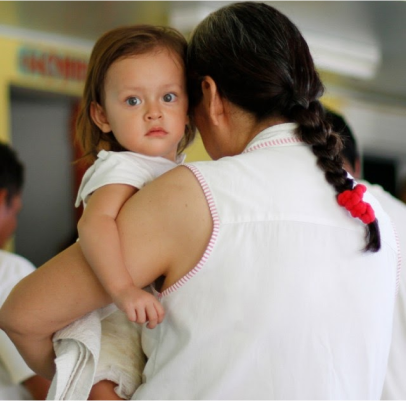
Little by Little: A Brief History
Close to 100 years old, somewhat dilapidated, located on the fringe of El Paso’s biggest barrio, and some ten blocks from the US/ Mexico border, this two-story, red brick building has been home to thousands of refugees and migrant poor. This building, this house of hospitality, this sanctuary, is known as Annunciation House.
In the winter of 1976, a small group of young adults first gathered to consider and discuss the possibility of undertaking a journey that would one day be known as Annunciation House. Their gathering was fostered by a desire to experience the Gospel more deeply. Especially strong was the realization that the Gospel calls us all to the poor and that the life and presence of Jesus in the Gospels is so completely in relation to the poor.
For over one year this small group met weekly for prayer, discussion, and discernment. Little by little the principles that would guide Annunciation House came into being. Whatever was done, it would have to be in solidarity with the poor. The lifestyle would be simple and lived in community. Any work or service would be offered freely. Those accepting this journey would be volunteers, receiving no pay or wages. In order to better understand the insecurity and instability with which the poor live, it would never be possible to seek or accept permanent funding sources. Instead, Annunciation House would be sustained by the spontaneous generosity of those who wanted to be a part of the work by supporting it. Nothing would be accepted that had strings attached. Lastly, the service offered would be to those most in need, to those who could not be assisted by existing programs, agencies or offices.
In the fall of 1977 the second floor of an old building owned by the Diocese of El Paso became vacant. With the help and blessing of then Bishop, Sidney M. Metzger, the diocese loaned the building. On February 3, 1978, five of those young adults moved into the building with no money or other resources, and only vague ideas about how the poor would be served. What was certain was that in making themselves available to the poor, the poor would show the way and do the teaching.

The beginning was difficult. After arriving it became clear that there was no real sense of who the poor were, and if a poor person were to come, there was a sense that the group would not know what to do with him or her. Fortunately for the volunteers, the building was in need of cleaning and repairs. This provided an initial agenda for the group while they waited to come to some understanding of what God was asking. One day a call came asking the group to take in a teenager who had been living in the streets. In accepting this young man Annunciation House made the first of two basic decisions that would define the work it would do. In accepting this young man, it in effect said that Annunciation House would be a house of hospitality for the homeless poor. It was not long before a second guest was accepted, then a third, then a fourth and so on. There would come a time when there would be more than 100 guests at the house at one time.
The second basic decision about the work of the house came with the realization that in the El Paso community, there was an entire group of people who were unable to receive any of the social services that are ordinarily available to the poor.
When referred to an agency, they would return to the house saying, They say they cannot help me because no tengo papeles, because I have no papers. There was no place where the undocumented could receive such basic services as food, shelter, clothing, and medical attention. In the El Paso community the undocumented were among the poorest and the most in need. And thus the decision was made that the undocumented would be the ones whom Annunciation House would primarily serve.
And so it was that little by little the volunteers were taught about who the poor were, about welcoming them and about serving them. With time the life and work of the house evolved, as did the volunteers themselves. Some left and new ones came. There has never been but a small number of volunteers living and working in the house at any given time. So also has the work never been but a tiny effort in the face of great numbers and tremendous needs.
There is always more left to be done at the end of the day than there was when it started. There is always a never-ending flow of guests to be welcomed and assisted. There is always a new opportunity to discover the meaning of Johns words, Little children, let us love in deed and in truth and not merely talk about it. There is always a never-ending opportunity to serve and meet Christ among the poor and to little by little experience the Gospel more deeply and try to live it more fully.

A Philosophy
From that day in February of 1978 when the doors first opened, the volunteers of Annunciation House have sought to simply live the Good News of the Gospel. And it has been the experience of their own deep hunger for meaning and purpose in life that has led them to seek out Jesus where he is most present, most touchable, and most vibrant. It is out of a sense of their own poverty that they go in search of where that emptiness can best be filled, can best be healed and nourished.
The volunteer workers must know that Jesus demands solidarity with and among all of his poor, because it is in the wounded poor and oppressed that He brings about his kingdom and the world’s redemption. From this philosophy comes the strength to accept a simplicity of lifestyle. From this belief comes the courage to act and even to place at risk one’s very person when justice demands it. From this Good News comes the compassion and freedom that love must have in order to empower one to touch the flesh of what the world has called outcast or alien. And all of this is done by the volunteers with many imperfections, errors, fears, moments of doubt, and with an ever-present sense of their humanity and capacity to be uncharitable. Annunciation House is not a job or a work site. It is a way of being and living at a particular point in one’s life. The work is one’s life and the living is one’s work.